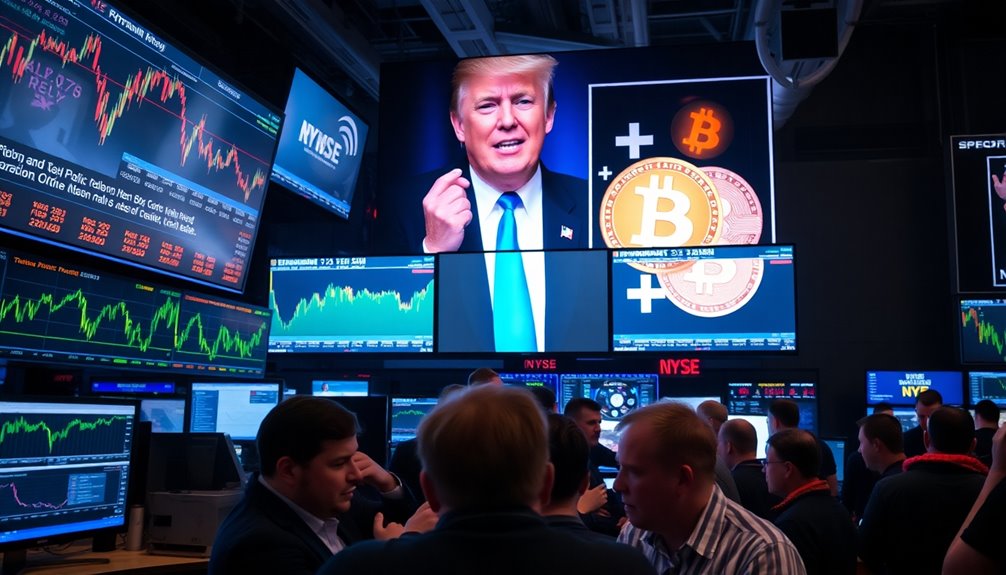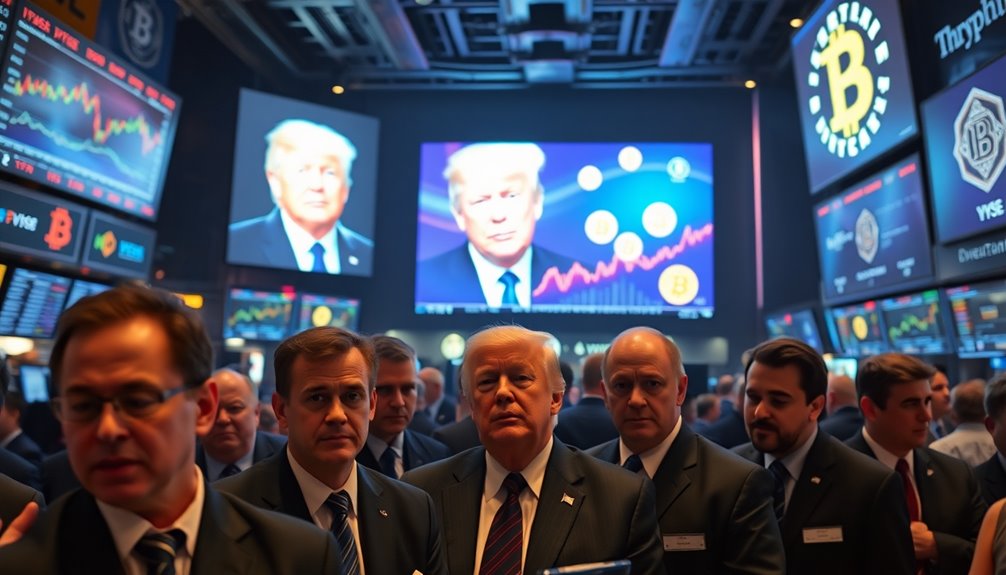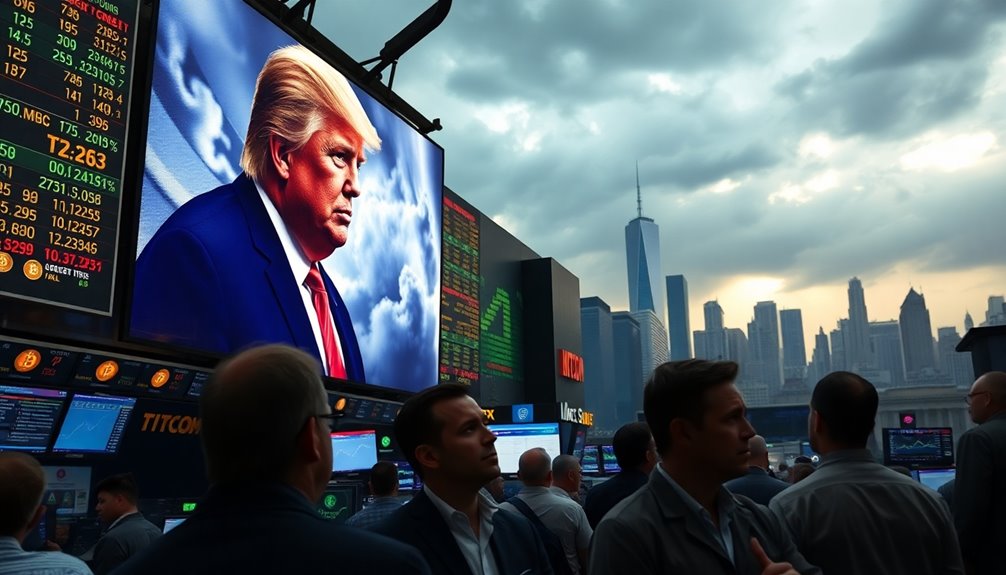Trump's contradictory crypto strategies are definitely threatening the Bitcoin rally. His mixed signals create confusion among investors, especially amid economic uncertainty. While he hints at a more favorable regulatory environment, potential tariffs and a strong dollar add to market instability. The lack of a clear crypto framework leaves many unsure. On the flip side, corporate investments in Bitcoin are surging, indicating some optimism. However, the overall volatility driven by market sentiment can lead to panic selling. To get a clearer picture of what this means for Bitcoin's future, you might want to explore further details on the subject.
Key Takeaways
- Trump's mixed signals on crypto create uncertainty, affecting investor confidence and potentially threatening Bitcoin's rally.
- The proposed regulatory framework remains unclear, leading to further market instability for digital assets.
- A strong dollar and high employment figures contribute to investor pressure, complicating the crypto landscape.
- Upcoming pro-crypto executive orders may mitigate some concerns, but investor anxiety persists due to past contradictions.
- Corporate investments in Bitcoin are rising, but Trump's inconsistent policies could undermine trust in the market's future.
Trump's Mixed Crypto Signals

As uncertainty looms over the economy, Trump's mixed signals regarding cryptocurrency are creating a complex landscape for investors.
His potential tariff plans introduce market instability, pressuring digital assets like Bitcoin. With a strong dollar fueled by robust employment figures and higher bond yields, many investors are feeling the pinch. Additionally, Trump's proposal for a clear regulatory framework for crypto assets has yet to materialize, contributing to investor anxiety.
Tariffs could spark inflationary pressures, complicating the economic dynamics further. The Fed's cautious stance on interest rates only adds to the uncertainty.
Consequently, Bitcoin's performance is impacted negatively, as the market reacts to these developments. While there's some optimism around potential regulatory changes under Trump, immediate shifts seem unlikely, leaving you maneuvering a choppy market with cautious optimism.
Trump's Crypto Policy Reversal

While many investors watch the evolving landscape, Trump's crypto policy reversal signals a potential shift towards a more favorable regulatory environment for digital assets.
With new SEC leadership under Hester Peirce and Mark Uyeda, you can expect a clarification on crypto asset classifications and a reversal of Gary Gensler's aggressive enforcement actions.
Paul Atkins' nomination as SEC chair indicates a focus on fraud accountability rather than a crackdown. Incoming SEC Chair Paul Atkins aims to implement more crypto-friendly regulations to support this shift.
Trump's pledge to suspend government bitcoin sales and appoint crypto-friendly officials further positions the U.S. as a pro-crypto nation.
As the administration prepares to issue a significant pro-crypto executive order, the establishment of a crypto advisory council could foster collaboration between industry leaders and regulators, easing uncertainty for investors.
Crypto Market Volatility Analysis

Understanding the factors driving crypto market volatility is essential for maneuvering this unpredictable landscape. Market sentiment plays a significant role; positive news can lead to price surges, while negative developments often trigger panic selling.
The herd mentality amplifies these fluctuations, as fear and uncertainty can cause dramatic market shifts. Additionally, the emergence of decentralized finance (DeFi) platforms has provided access to previously excluded individuals, further complicating market dynamics.
Supply and demand dynamics also influence volatility. Limited supply, like Bitcoin's 21 million cap, can heighten price pressure, especially when demand spikes.
Additionally, the actions of large investors, or "whales," can dramatically impact prices, given the market's limited liquidity.
Lastly, regulatory changes create uncertainty, prompting swift reactions that can lead to sudden price swings. Staying informed about these factors is essential for maneuvering this fast-paced market.
Corporate Crypto Investments Surge

Corporate crypto investments are experiencing a significant surge, driven by a blend of evolving market conditions and increased regulatory clarity.
Companies are increasingly recognizing the potential of digital assets to enhance their treasury management and risk strategies.
Here are three key factors fueling this trend:
- Corporate Adoption Trends: MicroStrategy leads the way, with substantial Bitcoin holdings and recent acquisitions pushing total corporate BTC in treasuries to 998,374. This surge reflects a broader 31% increase in corporate BTC holdings in 2024.
- Institutional Adoption: Major investment firms are integrating digital assets, with tokenization of real-world assets expected to reach $600 billion by 2030.
- Corporate Motivations: Businesses now view Bitcoin as a valuable store of value, driving further integration into traditional financial systems.
This shift marks a pivotal moment in the crypto landscape.
Election Campaigns and Crypto Impact

The surge in corporate crypto investments isn't just reshaping financial strategies; it's also making waves in the political arena as election campaigns increasingly focus on the cryptocurrency sector.
The crypto industry has invested over $100 million in races nationwide, particularly in Senate contests like those in Ohio and Montana, where pro-crypto candidates secured significant wins. Crypto PACs focused efforts in Ohio led to the defeat of anti-crypto Senator Sherrod Brown, highlighting the industry's influence on political outcomes.
Organizations like Fairshake and Defend American Jobs have played essential roles in these successes, aiming to make crypto a pivotal voter issue.
With 73% of crypto investors saying a candidate's stance on crypto influences their vote, the industry's backing could shift legislative landscapes, fostering a more favorable Congress for crypto regulation and ensuring that crypto remains a hot topic in upcoming elections.
Regulatory Landscape Shifts Ahead

As the cryptocurrency market evolves, regulatory shifts are becoming inevitable, impacting how firms operate both domestically and internationally.
You need to stay informed about these changes, as they can directly affect your business strategies and compliance measures.
Here are three key areas to focus on:
- Evolving International Regulations: Familiarize yourself with the EU's MiCA and the OECD's CARF for enhanced compliance.
- U.S. Regulatory Developments: Keep an eye on state-level initiatives and federal shifts, especially with the anticipated crypto advisory council. Enhanced KYC processes are expected to play a significant role in shaping these developments.
- Emerging Regulatory Frameworks: Prepare for DORA enforcement and consider adopting automated compliance tools to streamline operations.
Navigating this complex landscape will be essential for sustaining your firm's growth and ensuring compliance amidst shifting regulations.
Frequently Asked Questions
How Does Bitcoin Compare to Traditional Currencies?
When you compare Bitcoin to traditional currencies, you'll notice key differences.
Bitcoin is decentralized and immune to counterfeiting, whereas traditional currencies rely on central authorities.
Transactions using Bitcoin are fast, low-cost, and secure, while traditional transfers can be slow and expensive.
Additionally, Bitcoin offers more privacy, as personal information isn't linked to transactions.
However, Bitcoin's value is volatile, unlike the more stable nature of traditional currencies.
What Role Does Media Play in Crypto Price Fluctuations?
Did you know that crypto-specific media sentiment greatly correlates with cryptocurrency prices?
When you consider how much media influences public perception, it's clear that what you read can shape your investment decisions.
Positive or negative news can lead to immediate price fluctuations, while social media amplifies voices that sway market trends.
Are There Risks in Investing in Cryptocurrencies?
Yes, there are significant risks in investing in cryptocurrencies.
You could face transaction irreversibility, where once you send funds, there's no turning back. Lost passwords and incorrect sending addresses can lead to permanent losses.
Regulatory uncertainties and potential crackdowns can impact the market. Additionally, deceptive management practices and unverified partners increase your risk of scams.
Always be cautious, as vulnerabilities in software and smart contracts can also result in substantial financial losses.
How Do Global Events Impact Bitcoin's Value?
Global events can greatly impact Bitcoin's value. When geopolitical tensions rise, you might see a drop in Bitcoin as investors seek safer assets.
Macroeconomic factors, like inflation and monetary policy shifts, can either boost or hurt its attractiveness as an alternative currency.
Additionally, institutional adoption and regulatory changes influence market sentiment, affecting Bitcoin's stability.
Staying informed about these global events helps you better navigate Bitcoin's unpredictable price movements.
What Are the Environmental Impacts of Bitcoin Mining?
Bitcoin mining has significant environmental impacts.
You'll notice its carbon footprint, emitting around 86 megatons of carbon annually, largely from fossil fuels. The mining process also consumes vast amounts of water, especially where hydropower is used.
Additionally, it occupies substantial land, contributing to deforestation and habitat loss. While over 50% of mining utilizes renewable energy, the need for sustainable practices remains essential to mitigate these environmental issues.
Conclusion
As you navigate the tumultuous waters of the crypto market, Trump's contradictory strategies can feel like a double-edged sword. One moment he champions innovation, the next he hints at tightening regulations. This unpredictability can shake investor confidence and create volatility, much like a storm brewing on the horizon. Staying informed and adaptable is essential, as the election campaigns and shifting regulatory landscape will certainly influence the future of crypto investments. Keep your eyes peeled; change is always just around the corner.









